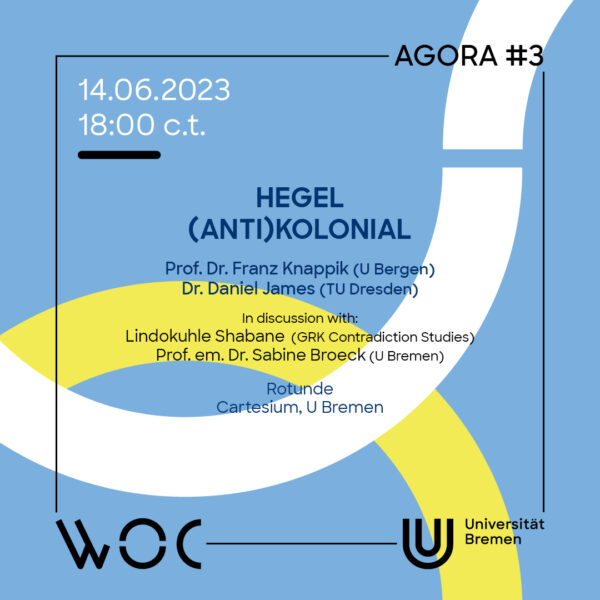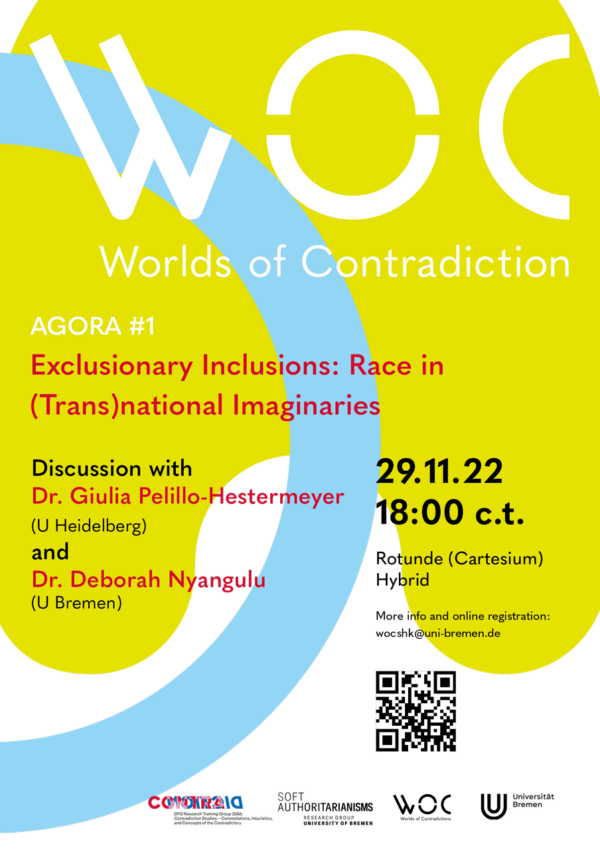Podiumsdiskussionen
Vergangene Termine
-
 Constitution and/or Declaration. Discussing the Question of the (Linguistic) Construction of Contradictions
Constitution and/or Declaration. Discussing the Question of the (Linguistic) Construction of ContradictionsIn this Lunchbox we want to discuss what it means to consider contradictions a product of declaration. In order to make clear the history and theoretical assumption of this concept, we want to give a brief input on Speech Act Theory and provide some concrete examples of declarations of contradictions. The main part of this […]
-
 Afrospanish Literature. Between Activism and Creating References
Afrospanish Literature. Between Activism and Creating ReferencesIm Rahmen des 3. Wuppertaler Malala Day 2023.
-
 Blackness as a Universal Claim. Holocaust Heritage, Noncitizen Futures and Black Power in Berlin
Blackness as a Universal Claim. Holocaust Heritage, Noncitizen Futures and Black Power in BerlinDamani Partridge from U Michigan discusses his new book Blackness as a Universal Claim. Holocaust Heritage, Noncitizen Furtures and Black Power in Berlin with Rozena Maart (U KwaZulu-Natal) and Lewis R. Gordon (UCON), moderated by Katrin Antweiler (IfEK/WoC, U Bremen).
-
 Hegel (anti)kolonial
Hegel (anti)kolonialHegel arguably developed and disseminated racist and pro-colonialist views. At the same time, he has been a source of inspiration for generations of progressive philosophers, incl. thinkers in the Black radical tradition and their accounts of liberation. „Hegel(anti)kolonial“ is a project that aims to examine this ambivalent colonial legacy, both by discussing Hegel’s own texts and thought and by exploring issues of race and colonialism in traditions of post-Hegelian thought. In this talk, we exemplify this approach by focusing on one key instance, the topic of transatlantic slavery. In lectures and publications during his Berlin period, Hegel provides a series of comments on transatlantic slavery that we discuss in the first part of our talk. Constructing the debate on the abolition of slavery as an ‚antinomy‘ between anti- and pro-slavery views, he argues that slavery ultimately has to be overcome, but he also holds that as a tool for ‚disciplining‘ people of African descent (who, on his degrading account, lack the mental preconditions for a life in freedom) slavery is provisionally legitimate, and should not be abolished immediately. Hegel’s partial defense of slavery draws on his famous ‚master-slave‘ dialectic, which later would become a point of reference for various authors in the Black radical tradition. Among them, the second part of our talk singles out Angela Davis, who discusses the master-slave dialectic in her 1970 Lectures on Liberation, through the lens of Frederick Douglass’s account of his liberation. As we will show, Davis separates the ‚master-slave‘ dialectic from its apologetic context and drops the racialist background assumptions that supported Hegel’s partial defense of slavery. Instead, she emphasises the role of struggle (as opposed to ‚discipline‘) in liberating the enslaved. Davis, too, conceptualizes these issues in terms of a contradiction, but she locates it elsewhere than Hegel with his ‚antinomy‘ of slavery − namely, in the ‚paradox‘ of bourgeois philosophy that claims freedom for all humans, while de facto denying it to many.
-
 (Breaking) Barriers in Academia: Mapping the Field
(Breaking) Barriers in Academia: Mapping the FieldThe dominant understanding of academia assumes that beneficial participation for all involved (students, early career researchers, academic staff…) is based primarily on the ability to make a valuable intellectual contribution to research. In reality, however, universities – and higher education as a whole – are complex social systems in which the agency and access of each individual is determined in multiple ways, including by gender, ethnicity, social class, and health status. These determinations can create powerful cultural and social barriers and inequalities. In the panel discussion „(Breaking) Barriers in Science: Mapping the Field,“ we will try to overcome the taboo of not addressing them, identify the most common types of barriers, consider strategies for addressing them, and narrow down the future content of our Navigating Academia series.v
-
 Im Rückblick: Die Flucht über die Prager Botschaft 1989
Im Rückblick: Die Flucht über die Prager Botschaft 1989Podium zur Diskussion über die Erinnerung an die Ereignisse im Herbst 1989 in der deutschen Botschaft in Prag, im Rahmen des Theaterstückes „Über den Zaun“.
-
 Exclusionary Inclusions: Race in (Trans)national Imaginaries
Exclusionary Inclusions: Race in (Trans)national ImaginariesThe first discussion in WoC’s new Agora format will focus on the exclusionary effects of contemporary discourses and politics of inclusion. Taking the globalization and mediatization of the Black Lives Matter movement as a starting point, the event will discuss transcultural negotiations of anti-racism against the backdrop of different colonial histories.
